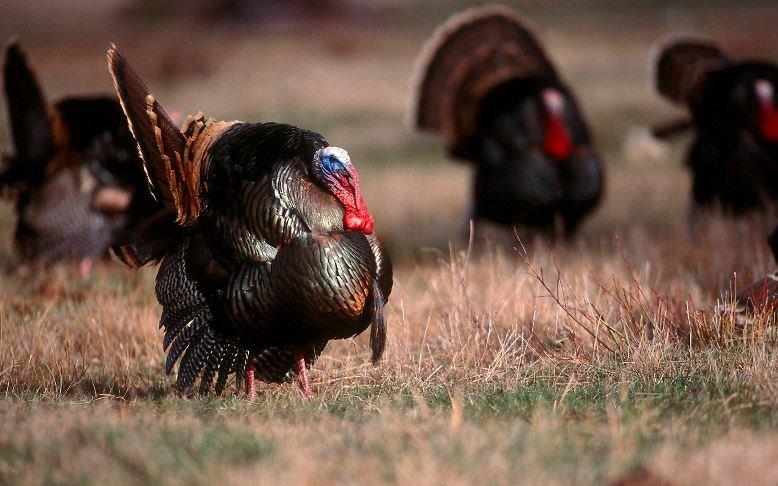Travel Like You're Dying To Turkey Hunt
We're celebrating 30 years of Realtree turkey hunting this season (1986-2016). This feature article first appeared back in 2001 as The Traveling Turkey Hunter, a chapter in the Team Realtree Turkey Hunting Fieldbook. Written by the late Aaron Pass, and as the title suggests, it contains fundamental tactics to help turkey hunters hunt new locations.
- Steve Hickoff, Realtree.com turkey hunting editor
As distance from home increases and habitat changes, the challenges for successful turkey hunting expand.
UNFAMILIAR TERRAIN
The standard turkey hunting advice of know the ground goes out the window on unfamiliar terrain, whether it be in South Dakota or in south Texas. Traveling hunters relinquish terrain familiarity, a tremendous tactical turkey hunting advantage. They encounter strange terrain, strange plants, and turkeys with different habitats, movement patterns, and food habits than the birds back home.
CALLING SKILLS
Fortunately for hunters, the language of love is universal for the five subspecies of wild turkey found in North America. Good calling takes on added importance (as do good camouflage and basic woodcraft skills), for the hunter who has forsaken home field advantage. When off your turf, the ability to use a variety of calls well and the ability to read and respond to a hunting situation quickly are the traveling hunter's best tactical cards.
HUNTING TIME
The traveling hunter plays against the clock. You are a long way from home and don't have all season to fiddle around. Changes in weather, fickle gobblers, and other circumstances beyond your control can further eat up your hunting time. Allow a reasonable amount of time to have a successful hunt. Discounting single-morning invitations to local properties, a three- to five-day hunt is realistic for a serious hunter. Fewer than three days is being overly optimistic.
ACCELERATED SCOUTING
One of the best things you can do is to plan to reach a hunting area a day or so early. Just having a look at the country in daylight before your hunt is a big help. That first hunting day is critical. If you don't get a gobbler during the first few hours, go into an aggressive hunting mode. You've got a lot to sort out fast. If you didn't hear a gobbler at all, you must find out if you are hunting where turkeys are or if they just didn't gobble. If you heard gobblers but could not entice one, you must make a quick read on whether they are still with hens or have been heavily pressured and are call shy. [Editor's note: Call shy" is a highly debatable subject these days.]
SCOUT WHILE YOU HUNT
It is always a good idea to start softly, both in terms of calling and when it comes to aggressive tactics. But as that first morning slips away, start moving and calling more aggressively. While trying to find a receptive gobbler, look for fresh sign, both turkey and human. Fresh turkey sign is good, but lots of human sign indicates heavy hunting pressure and probably call-shy birds. If you are in an area that allows only morning hunting, go for an afternoon walk without a gun. Otherwise, hunt all day. Try to roost a bird in the evening. Nothing is so comforting in the morning as having put a bird to bed the evening before.
PLANNING THE TRIP
Good research and planning save hunting time. Your goal is to know as much as possible about the country, its turkeys, and other pertinent details before you go. This is just as important for the hunter who is only going across the state as for the Grand Slammer heading cross country. Contact the state game agency and make a standard informational request. This includes maps of the general area, specific maps of public land, turkey harvest reports, pertinent regulations, and license requirements. Study this material and make notes where you need additional details or clarification. You might even want to call the state turkey biologist with specific questions about the resource and practical hunting information. [Go here for more Realtree turkey hunting planning tips.]
HUNTING LICENSE TO GO
If going out of state, pay particular attention to the regulations. Nothing spoils a trip quicker than to get called on a technical. Prearrange for your hunting license if possible. Not every little crossroads store carries nonresident licenses. Once you get on site, spend your time hunting turkeys, not licenses. [Online hunting license availability solves this problem these days.]
WHAT YOU NEED TO KNOW
Your research should point out things you need to know. What sort of terrain? What sort of gear? Hunting Osceolas in Florida means wading in swamps; hunting Merriam's in New Mexico means climbing mountains. What about spring weather conditions? Temperatures? Bugs? Potential for rain or even snow? What sort and color of camouflage? Sorting out these and other practical considerations should give you a reasonably accurate mental picture of what you are getting into and how to be prepared for it. Membership in the NWTF offers access to a national network of dedicated hunters. While you can't just call up a local Federation member and get a free guided hunt (though such things have happened), you probably can get sound information about local conditions.
GOING THE GUIDED ROUTE
Booking with a hunting lodge or a professional guide is an increasingly popular plan. Though this seems pricey, it can be a wise move. Even if you want to call in your own birds, when you are journeying far afield, having the guidance of a local is cost efficient for successful, short-duration trips. If going this route, the traveling turkey hunter needs to be every bit as careful as the globe-trotting, big-game hunter. Before plunking down a deposit, check the guide's credentials, references, and tenure in business. Even so, the best recommendations usually come from your own contacts. Ask your turkey hunting friends where (and with what outfitters) they've had good hunts. In terms of travel hunting strategy, good research and planning, along with the ability to hunt with intensity, intelligence, patience, and persistence are the keys to success. Sure, luck plays a part, but generally speaking, luck favors the prepared.
[Go here for more Realtree turkey hunting.]








